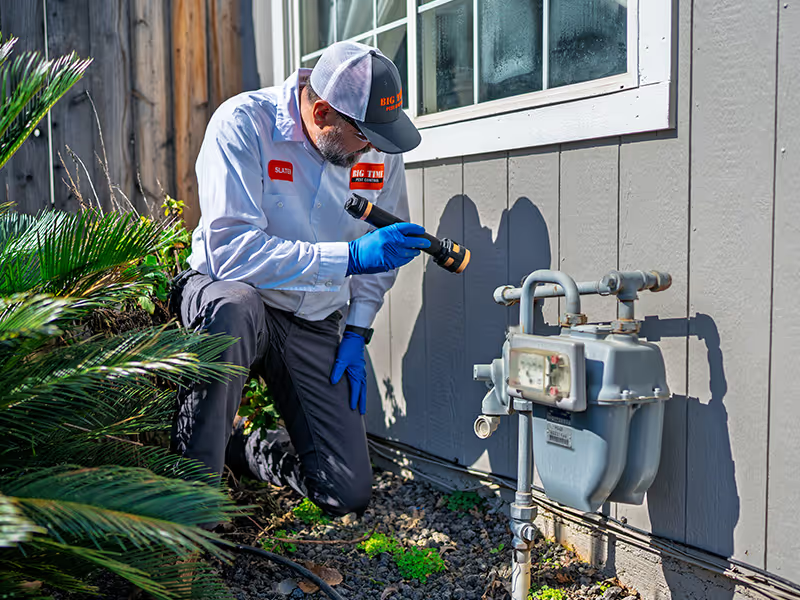Why is Rodent Exclusion Important in Sacramento?
Sacramento's climate, especially during the fall and winter months, makes it an ideal environment for rodents. As the temperature drops, rodents like roof rats, Norway rats, and house mice search for warm, safe places to nest, and your home is a prime target. Rodents are not only a nuisance—they can cause significant damage by chewing through wires, insulation, and even structural components of your home. They also carry diseases and can contaminate food sources.
How Does Rodent Exclusion Work?
Rodent exclusion is a systematic process that includes several key steps to prevent mice and rats:
1. Inspect Your Home for Entry Points
A thorough inspection of your home’s exterior and interior is the first step. This includes checking the foundation, walls, roofline, vents, windows, doors, and any other areas where rodents could gain entry. Sacramento homes, especially older ones, often have more vulnerable spots due to settling and wear over time.
- Exterior inspection: Start by walking around the outside of your home, looking for any cracks, holes, or gaps where rodents could gain access. Focus on areas where pipes, wires, or vents enter your home, as these are common entry points.
- Roof and attic: Rodents are excellent climbers, so check the roofline, eaves, and attic for holes. Roof rats, in particular, are known to nest in attics.
- Foundation and basement: Look for cracks in the foundation and around basement windows. Even tiny gaps in these areas can serve as entry points for mice and rats.
2. Seal Entry Points
Once you’ve identified where rodents may enter, seal these openings using materials that rodents can’t chew through. Consider these options:
- Steel wool and caulk: Steel wool is a great option for small cracks and holes, as rodents cannot chew through it. Caulk can be used in conjunction to seal smaller gaps.
- Hardware cloth or wire mesh: For larger gaps, use hardware cloth or wire mesh to close off entry points. Ensure the mesh has small openings (no larger than ¼ inch) to prevent rodents from squeezing through.
- Foam sealant: Expanding foam can be used to fill larger holes, especially around pipes and utility lines. Be sure to follow up with a layer of steel wool or mesh for added protection.
In some cases, physical barriers like mesh screens or one-way exclusion devices are installed in areas like vents or chimneys. These barriers allow airflow while keeping rodents out.
3. Eliminate Attractants
Rodents are always on the lookout for food, water, and shelter, and they’ll take advantage of any opportunity to get into your home. The good news is that by keeping your property clean and well-maintained, you can make your home a lot less inviting for them. Here’s how to keep things tidy and rodent-free:
- Food Sources: Store all food in sealed containers and clean up crumbs and spills right away. Don’t leave pet food out overnight, as it can attract unwanted visitors.
- Trash Management: Keep your trash cans tightly sealed, and if possible, store them away from the house. Rodents are scavengers, and unsecured trash is like an all-you-can-eat buffet to them.
- Landscaping: Trim back trees, bushes, and shrubs that are close to your home. Rodents can use tree branches to climb up and access your roof, so keeping branches well-pruned can block their path.
- Yard and Garage Cleanliness: Remove clutter from around your yard and garage, like piles of leaves or firewood. These provide perfect hiding spots and nesting areas. Store firewood off the ground, and keep the garage organized to avoid creating a cozy rodent home.
- Trim Overgrown Vegetation: Trim shrubs, vines, and tree branches near your home to prevent rodents from accessing your roof or attic.
- Gutters and Downspouts: Clean your gutters regularly to prevent water buildup that attracts rodents. Make sure your downspouts direct water away from your home’s foundation, which helps keep things dry and less attractive to pests.
By staying on top of these simple maintenance tasks, you’ll make it harder for rodents to find a way into your home, and you’ll be able to enjoy a cleaner, safer living space.
Additional Tips for Sacramento Homeowners
- Install rodent-proof door sweeps: Ensure all exterior doors have tight-fitting sweeps to block access for rodents.
- Consider rodent-proof vent covers: These are especially important for crawl spaces and attics where rats can enter.
- Regular inspections: Even after sealing entry points, make it a habit to inspect your home annually for new cracks or gaps that may have developed.
Professional Rodent Exclusion
Rodent exclusion is an essential step for homeowners in Sacramento to prevent infestations and minimize damage. By thoroughly inspecting your home, sealing entry points, eliminating attractants, and keeping your property clean, you can significantly reduce the risk of rodents entering your home.
If you're unsure about how to properly seal your home or want to ensure a thorough job, don’t hesitate to call a local Sacramento pest control expert for assistance. Regular exclusion practices will protect your home and provide peace of mind knowing that your family is safe from potential rodent problems. Contact us today to learn more!



















